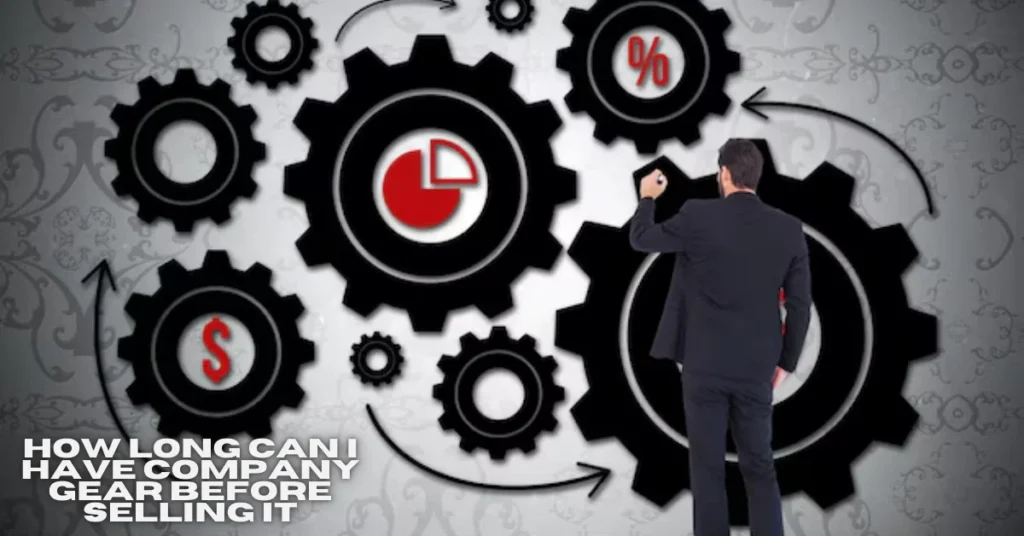Have you ever wondered how long you can hold onto how long can i have company gear before selling it deciding to sell it? It’s a question that many employees face, especially when they find themselves with tools or equipment they no longer need. Whether it’s a laptop from your last job or some high-tech machinery, figuring out the right time and method for selling these items can be tricky.
Navigating the rules and regulations surrounding company-owned gear is essential. There are several factors at play: legal implications, value depreciation, and even alternatives to selling that might serve you better in the long run. Let’s dive into this topic thoroughly so you can make informed decisions about your company gear without stepping on any toes!
Understanding Company Gear
Company gear refers to any equipment, tools, or devices provided by your employer for work-related tasks. This can include laptops, software licenses, uniforms, and machinery. Each item typically comes with specific usage guidelines.
Understanding the nature of this gear is crucial. It’s often considered company property, meaning it’s not yours to keep indefinitely. Many organizations have policies in place regarding how long employees can utilize these items.
Additionally, some companies may require their gear back upon termination of employment or after a project concludes. Familiarizing yourself with your organization’s policy helps prevent any misunderstanding about ownership and responsibility.
Recognizing the value of this gear also matters. Items depreciate over time; what was once cutting-edge technology may lose significant worth as newer models emerge. Understanding all these aspects will help you navigate future decisions about selling or keeping company gear safely and legally.
Guidelines for Selling Company Gear
When considering selling company gear, start by reviewing your company’s policies. Each organization has different rules about asset disposal. Familiarize yourself with these guidelines to avoid potential pitfalls.
Next, determine the condition of the gear. Ensure everything is in working order. Clean and repair items if necessary; they’ll fetch a better price that way.
Research market value before listing any item for sale. Online platforms can provide insights into what similar gear sells for. This helps you set a competitive price.
Transparency is key during sales transactions. Disclose any wear or tear upfront to build trust with buyers.
Consider timing carefully. Selling off equipment when demand is high can drastically increase your profit margin—so keep an eye on industry trends that might affect interest in certain types of gear.
Legal Implications of Selling Company Gear
Selling company gear isn’t just a matter of personal choice. It comes with legal responsibilities that you must be aware of.
First, consider your company’s policies. Many organizations have strict rules about the disposal or resale of equipment. Ignoring these could lead to disciplinary actions.
Next, think about intellectual property rights. Some tools and devices may contain proprietary technology or branding elements that cannot be sold without permission.
Additionally, confidentiality agreements might restrict selling items associated with sensitive projects or information. Breaching these contracts can result in serious consequences.
If the gear was financed through loans or leases, ensure you’re not violating any terms by attempting to sell it prematurely. Always consult your HR department or legal counsel before making any moves in this area.
Maximizing the Value of Company Gear Over Time
Maximizing the value of company gear requires a proactive approach. Regular maintenance is essential. Clean and store items properly to prevent wear and tear.
Documenting usage can also help track depreciation. Keep records of repairs or modifications, as they may enhance resale value later on.
Consider timing when you decide to sell. Market demand fluctuates, so research trends related to your specific gear type. Selling during peak seasons often fetches better prices.
Networking with industry peers can provide insights into potential buyers who appreciate quality equipment.
Keep an eye on emerging technologies that could affect your gear’s relevance or desirability in the market. Adapting accordingly will ensure you’re always ahead of depreciation curves.
Alternatives to Selling Company Gear
If selling company gear isn’t the right move for you, consider donating it. Many local charities or schools appreciate equipment that can be put to good use. This option not only clears out your space but also helps those in need.
Another alternative is leasing the equipment. This allows you to retain ownership while generating some passive income. It’s a win-win if managed correctly.
You could also explore renting out the gear on platforms designed for this purpose. It’s an effective way to keep your items circulating without letting them sit idle.
Consider repurposing old equipment for personal projects or creative endeavors. Transforming company tools into something new can bring satisfaction and reduce waste at the same time. Each of these options opens doors beyond simply selling what you no longer need.
Tips for Properly Managing and Maintaining Company Gear
Properly managing and maintaining company gear is crucial for longevity. Start with a clear inventory list. Keep track of all items, their condition, and maintenance schedules.
Regular cleaning goes a long way. Dust off equipment after use to prevent buildup that can lead to wear and tear. For electronics, consider using appropriate cleaners designed for screens and surfaces.
Establish guidelines for usage among employees. Ensure everyone knows how to handle the gear correctly to avoid accidental damage.
Implementing routine inspections helps catch issues early on. Create a checklist that includes checking cables, battery life, and overall functionality.
Store items in designated areas when not in use. A clutter-free environment reduces the risk of accidents or loss. By following these tips, you can extend the lifespan of your company gear significantly.
Conclusion
Understanding Company Gear Company gear refers to any equipment, tools, or materials provided by an employer for work-related purposes. This can include anything from laptops and mobile devices to uniforms and machinery. Often, employees are entrusted with this gear during their employment. However, what happens when you leave the company? How long can you have company gear before selling it?
Guidelines for Selling Company Gear Selling company gear is not as straightforward as one might think. Many organizations have strict policies regarding the ownership of equipment after an employee departs. It’s essential to understand these guidelines before considering a sale.
Typically, most companies expect their employees to return all issued items upon termination of employment. Unauthorized selling of such items could lead to legal complications or even loss of severance pay.
Legal Implications of Selling Company Gear The legalities surrounding the sale of company property vary widely between industries and states. In many cases, unauthorized sales can be classified as theft or breach of contract.
If you’re uncertain about your rights concerning sold equipment, consult your HR department or review your employment contract carefully. Ignoring these aspects could result in financial repercussions down the line.
Maximizing the Value of Company Gear Over Time If you’ve determined that selling is indeed an option after confirming it’s permissible by your employer’s rules, then maximizing its value becomes crucial.
Keep in mind that condition plays a significant role in resale value. Regular maintenance helps maintain functionality and appearance—factors buyers appreciate greatly.
Researching market prices also aids in setting a competitive rate when it’s time to sell gear officially deemed yours by law and policy!
Alternatives to Selling Company Gear Instead of jumping straight into selling your old company gear consider other options first! Donating it can benefit those less fortunate while potentially providing tax deductions for yourself later on!
Alternatively renting out certain high-demand tools may help generate income without relinquishing full ownership immediately; just ensure adherence strictly follows local regulations governing rentals too!
Tips for Properly Managing and Maintaining Company GearProper management involves keeping detailed records
FAQs
What is “How Long Can I Have Company Gear Before Selling It?”
This question addresses the duration employees can retain company-issued equipment before considering selling it, emphasizing the importance of company policies and legal implications.
What types of gear are considered company property?
Company gear includes any tools or equipment provided by an employer for work, such as laptops, uniforms, machinery, and software licenses.
What should I check before selling company gear?
Review your company’s policies on equipment disposal, assess the gear’s condition, and ensure you comply with any legal or contractual obligations.
What are the legal risks of selling company gear?
Selling company property without permission can lead to legal issues, including claims of theft or breach of contract, so it’s crucial to consult HR first.
What are alternatives to selling company gear?
Consider donating the gear to charities, leasing it for passive income, renting it out, or repurposing it for personal use instead of selling.







